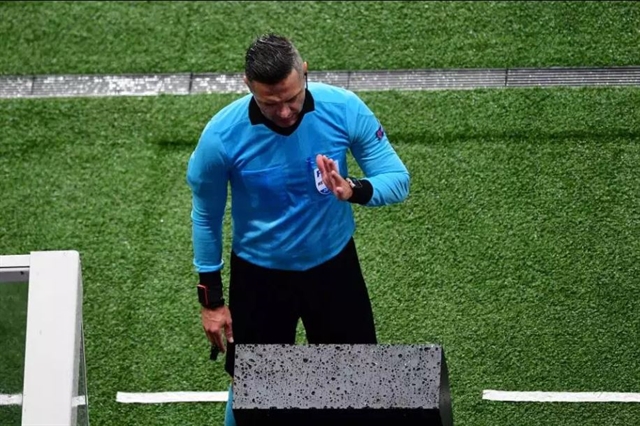 Sports
Sports

Love it or hate it, the video assistant referee is here to stay.

|
| CHECKING: A referee checks a monitor before making a decision. AFP Photo |
Paul Kennedy
Love it or hate it, VAR is here to stay.
I’ve written about the controversial video assistant referee in the past, and no doubt I will write about it again in the future, but last weekend it was introduced to the Premier League.
And the football following world is very much divided over the issue.
When it was first mooted, and tried at various lower levels, I’ll be the first to admit I was dead against the idea.
For me it took the soul out of football and made a fast and furiously-paced game a little too stop-start for my liking.
Plus, and this was the big deal for me, it made the match devoid of controversy, which I believe is an important part of a football fans’ psyche.
They say there is no better feeling than beating your rival team, but there is.
Beating your rival team by a late controversial goal. A dubious penalty or an offside goal that upon closer inspection should never have stood.
This, for me, made life worth living. Next morning in work seeing the faces of those fans from opposition sides who you have just wrongly beat, was brilliant.
And I’ve been on the receiving end of a far bit of stick as well when the boot was on the other foot.
I thought that VAR would destroy this, and make the post-match pint a boring affair.
But I’m having second thoughts.
On Saturday a goal by Gabriel Jesus for Manchester City against West Ham was ruled offside after consultation with VAR.
It was a tight decision, but the right decision. Raheem Sterling was in an offside position, but only just. Former Arsenal legend Ian Wright described it best saying the England star was “offside by his armpit”.
In the end City spanked the Hammers so the decision didn’t change the outcome and will have no effect whatsoever at the end of the season, bar the highly unlikely event Manchester City lose the league on goal difference.
In total, there were about 70 decisions that were checked by VAR with most already spotted by the referee and did not require a hold up in play.
Only three decisions were overturned.
In 1992 those in charge of football decided to introduce the back pass rule, preventing goalkeepers from handling the ball if it was played to them by one of their teammates.
This was done after a pretty boring 1990 World Cup when a number of teams were criticised for unduly time wasting.
At the time fans were up in arms, saying it would ruin the game. Today, 27 years after it was brought in, we hardly bat an eyelid.
So in time the same thing will be the case with VAR. And at some point in the future it will just be a natural part of the beautiful game.
But for that to happen those in charge do need to hurry things up, which I’m sure given some time they will.
What we really don’t want to see is long and drawn out decision making that leaves fans both at the game and watching on TV restless.
But as officials become more used to the system, things will speed up.
It has worked successfully in rugby, cricket and tennis so there is no reason at all why it can’t also work in football.
Sure managers will be miffed, and fans angry when the last-minute winning goal is disallowed because a player’s boot lace had wandered into an offside position, but once the furore fades and the hysteria cools, VAR will just become normal. VNS